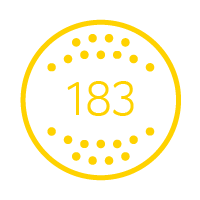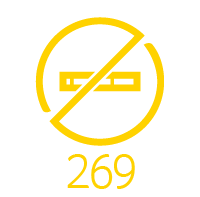Reducing cancer risk.
How you’ve made a difference in 2019/20
149,669 people were inspired to create healthy recipes for the whole family by visiting the Healthy Lunch Box website.
Helping golfers stay sun smart
Improve your long game is an important way to reach a high-risk group for skin cancers – men over 40.
In 2019/20, the program ran year-round and grew from 110 clubs to 183 clubs, thanks to a new partnership formed with Golf NSW.
Read more
82% of primary schools participated in our SunSmart Program, helping protect children from over-exposure to UV radiation.

183 golf clubs participated in Improve your long game in 2019/20, protecting more golfers from harmful UV radiation exposure. This is an increase of 69% from the previous year.

269 staff registered for the Tackling Tobacco eLearning training.
A jagged scar on Stacey’s right leg is a constant reminder of her brush with melanoma.
The 38-year-old mum-of-two was diagnosed with the potentially deadly form of skin cancer in June last year, after she noticed that a small mole on her thigh had changed shape.
Helping cancer patients quit smoking
Quitting smoking is one of the best ways for cancer patients to improve their chances of survival. The benefits of quitting for cancer patients include less complications from treatment, reduced risk of cancer occurrence, improved effectiveness of anti-cancer drugs, and improved post-surgery healing.
Cancer Institute NSW commissioned us to develop and deliver training across cancer centres in NSW, to help staff empower cancer patients to quit smoking. We trained 66 ‘champions’, from across 14 local health districts, as well as our own Cancer Council Liaisons including Kate Pallot, our Liaison based in the Albury Wodonga Regional Cancer Centre.
Keeping our kids safe from e-cigarettes
There is no conclusive evidence that e-cigarettes are effective at helping people quit smoking, and there is also growing evidence of that they pose a health risk to users. Alarming recent Australian data shows an increase in use of e-cigarettes over the past three years, with one in five students aged 16–17 admitting to trying them.
What’s next: Evaluating our flagship SunSmart program
The SunSmart program commenced in NSW primary schools in 2008. Although national studies have proven the impact and effectiveness of the program in Australia, there has been limited research about its effectiveness and implementation in our communities since its launch in NSW. An external research partner will independently evaluate SunSmart in NSW primary schools in 2020/21. The evaluation will determine the extent to which primary schools are implementing the program and utilising program resources, as well as the impact and effectiveness of the program for the NSW Primary School community.